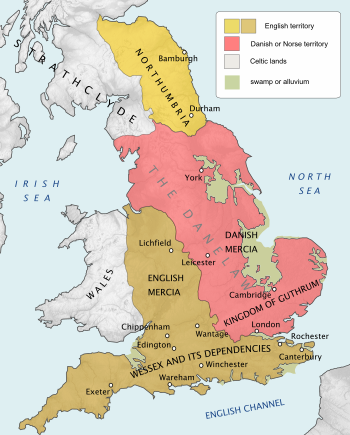English surnames of Norse origin: Difference between revisions
George Swan (talk | contribs) (first draft here) |
mNo edit summary |
||
| (5 intermediate revisions by 3 users not shown) | |||
| Line 1: | Line 1: | ||
{{subpages}} | |||
[[File:England 878.svg|thumb|350px|Much of the north of 9th century England was occupied by Norse invaders, who left behind descendants with Norse surnames.]] | [[File:England 878.svg|thumb|350px|Much of the north of 9th century England was occupied by Norse invaders, who left behind descendants with Norse surnames.]] | ||
Norse invaders ruled much of northern England, in the 9th and 10th centuries, and | Norse invaders ruled much of northern England, in the 9th and 10th centuries, and '''English surnames of Norse origin''' in the area now called the [[Danelaw]] can be traced to their influence.<ref name=OriginsOfEnglishSurnames/> | ||
Surnames were introduced in the 12th century, but mostly became hereditary only in the 14th and 15th. | |||
According to ''Origins of English Surnames'' and ''A Dictionary of English and Welsh Surnames: With Special American Instances'', [[English language|English]] surnames that have their source in the language of the Norse invaders include: | According to ''Origins of English Surnames'' and ''A Dictionary of English and Welsh Surnames: With Special American Instances'', [[English language|English]] surnames that have their source in the language of the Norse invaders include: | ||
| Line 33: | Line 36: | ||
[[Rolf]],<ref name=OriginsOfEnglishSurnames/> | [[Rolf]],<ref name=OriginsOfEnglishSurnames/> | ||
[[Seagrim]],<ref name=OriginsOfEnglishSurnames/> | [[Seagrim]],<ref name=OriginsOfEnglishSurnames/> | ||
[[Starbuck (surname)|Starbuck]],<ref name=DictSurnamesEnglishWelshAmerican/> | [[Starbuck (surname)|Starbuck]],<ref name=DictSurnamesEnglishWelshAmerican/><ref name=OriginsOfEnglishSurnames/>[[Thomassen]],<ref | ||
name=OriginsOfEnglishSurnames/>[[Thomassen]],<ref | |||
[[Storey (surname)|Storey]],<ref name=OriginsOfEnglishSurnames/> | [[Storey (surname)|Storey]],<ref name=OriginsOfEnglishSurnames/> | ||
[[Thurgood]],<ref name=OriginsOfEnglishSurnames/>[[Fell]] | [[Thurgood]],<ref name=OriginsOfEnglishSurnames/>[[Fell]] | ||
| Line 113: | Line 115: | ||
}} | }} | ||
[[Category:English-language surnames]] | [[Category:English-language surnames]][[Category:Suggestion Bot Tag]] | ||
Latest revision as of 16:00, 12 August 2024
Norse invaders ruled much of northern England, in the 9th and 10th centuries, and English surnames of Norse origin in the area now called the Danelaw can be traced to their influence.[1]
Surnames were introduced in the 12th century, but mostly became hereditary only in the 14th and 15th.
According to Origins of English Surnames and A Dictionary of English and Welsh Surnames: With Special American Instances, English surnames that have their source in the language of the Norse invaders include: Algar,[1] Hobson,[1] Collings,[1] Copsey,[1] Dowsing,[1] Drabble,[1] Eetelbum,[2] Gamble,[1] Goodman,[1] Grave,[1] Grime,[1] Gunn,[1] Hacon,[1] Harold,[1] Hemming,[1] Ketellbum,[2] Knott,[1] Kronick,[1] Mainwaring,[2] Mannerink,[2] Orme,[1] Osborne,[1] Osborn,[1] Osmund,[1] Quinnell,[2] Ransom,[2] Rogers,[2] Raven,[1] Rolf,[1] Seagrim,[1] Starbuck,[2][1]Thomassen,[1] Thurgood,[1]Fell Tookey,[1] Toope,[1] Toovey,[1] Tovey,[1] Truelove,[2] Tubb,[1] Turk.[1]
See also
References
- ↑ 1.00 1.01 1.02 1.03 1.04 1.05 1.06 1.07 1.08 1.09 1.10 1.11 1.12 1.13 1.14 1.15 1.16 1.17 1.18 1.19 1.20 1.21 1.22 1.23 1.24 1.25 1.26 1.27 1.28 1.29 1.30 1.31 1.32 Joslin Fiennes. Origins of English Surnames, Robert Hale Limited. Retrieved on 2017-10-26.
- ↑ 2.0 2.1 2.2 2.3 2.4 2.5 2.6 2.7 2.8 Charles Wareing Endell Bardsley. A Dictionary of English and Welsh Surnames: With Special American Instances, H. Frowde. Retrieved on 2017-10-26. Alt URL
